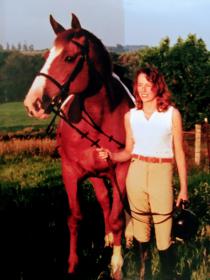Hmm. My main riding gelding is one of these. I adore him.
This horse isn’t spoiled, he’s not bratty. It harkens back to the phrase, “so they are started, so they go”. He simply doesn’t have much motivation - and why would he? From his point of view, no one has asked much of him in his life and he’s developed a way of existing that works for him. Now you’re coming in an demanding things of him and asking he change everything he thought he had working for him for the last decade. I’d be struggling with that, too.
That said, I wholeheartedly agree with mvp. This horse needs a job, not a dictator. I have started a lot of “late-bloomers” (by no fault of their own) and my experience is that most of them struggle more than your average 3yo with having the tables turned on them. That is not to say that many don’t turn out to be excellent riding horses. But there’s a lot to be said about the brain malleability you have with a young horses versus an older horse - not so much unlike people. How much easier is it to change your opinions and develop mental flexibility when you’re young compared to when you’re middle-aged?
If he’s a nice horse and you have the skill set to ride him and the creativity to help him gain the motivation to work (meaning you don’t have a set agenda for him that he must live up to) I’d take him in a heartbeat. But I also see the tendency towards lightness in front as an asset; it tells me the horse can get back on his hocks without protest or issue, and you bet I want that working for me. The trick is the “working for you” part.

